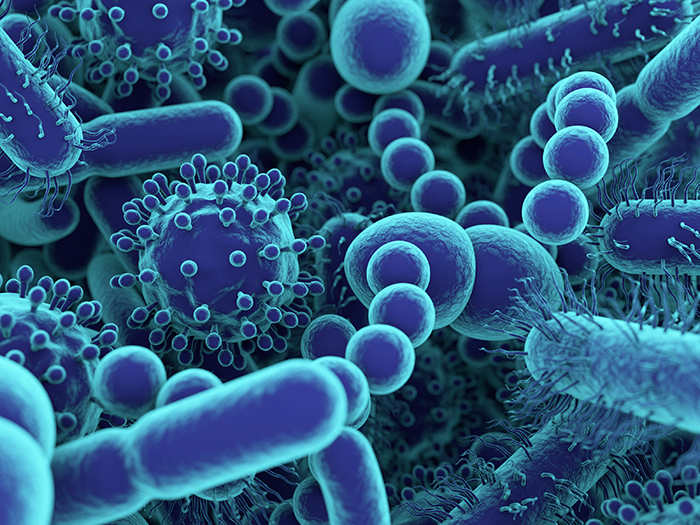5 Ways Your Gut Microbiome Keeps You Healthy
Trillions of microscopic bacteria hold the keys to your overall health. Here’s a glimpse at how they work their magic.
 Deep inside your body there’s a whole microscopic world made up of bacteria. There are about 10 trillion of these little bugs, and most live in your gut, also known as your intestinal tract.
Deep inside your body there’s a whole microscopic world made up of bacteria. There are about 10 trillion of these little bugs, and most live in your gut, also known as your intestinal tract.
In fact, there are more of their cells in your body than there are of yours. Who are these invaders? And what are they doing in your tummy?
Don’t worry. They’re friendly. Mostly.
“Your gut bugs help determine your overall health in a good way—or a bad way,” says gastroenterologist Gerard Mullin, M.D., an associate professor of medicine at Johns Hopkins University and author of The Gut Balance Revolution: Boost Your Metabolism, Restore Your Inner Ecology, and Lose the Weight for Good.
“You can help them do their job by the foods you eat and the way you live,” he adds.
All those bugs, living together in your belly, are known as your gut microbiome. Here’s a guide to what they do and how to keep them in line so you can stay happy and healthy.
Get and stay fit with SilverSneakers! Choose from dozens of different Community classes, visit a participating fitness location, or join one of 20+ SilverSneakers LIVE online classes. Check your eligibility here.
Gut Biome Job #1: Aid Digestion
The assortment of bacteria hanging out deep in your large intestine are there to break down big chunks of food into fuel that your body can use.
It’s a pretty good arrangement: Your body gets the energy source it needs, and the bacteria get plenty to eat and a cozy place to live.
Gut Biome Job #2: Boost Immunity
The bacteria in your belly also protect you from getting sick. A huge portion of your immune system, it turns out, is actually right there inside your gut, according to researchers from Johns Hopkins University.
Some of your gut bacteria have the single task of pumping out antibodies to protect you from autoimmune diseases like Crohn’s disease.
“Healthy, well-balanced gut bugs keep your immune system working well,” says Dr. Mullin. “They can even help prevent cancer—or help make cancer treatments more effective. That’s an example of the power of the biome.”
Recommended reading: Healthy Gut Microbiome: The SilverSneakers Guide
Gut Biome Job #3: Churn Out Nutrients
Your body’s a miracle machine, but it still needs a team of microbes in your gut to use the foods you eat to manufacture a supply of vitamins and other nutrients—including vitamin K, vitamin B, niacin, folates, and many others—that keep all the body’s systems running at peak capacity.
Gut Biome Job #4: Balance the Scale
When your gut microbiome is healthy and balanced, it’s easier to reach and maintain a healthy weight.
“The microbiome has indirect effects on your metabolism,” says Dr. Mullin. “So when you shift the balance of bacteria in your biome by eating the right foods, you can shift your metabolism toward weight loss.”
Gut Biome Job #5: Regulate Mood
You’ve likely heard about neurotransmitters. These are chemical messengers that send signals to your brain that regulate your mood.
A study in Nutrition Reviews showed that many of those messengers, like serotonin and gamma-aminobutyric acid (GABA), are actually produced by your gut bacteria. As a matter of fact, there’s constant back-and-forth communication between your gut microbiome and your brain.
“There’s evidence that too much inflammation can lead to depression, so your gut bacteria send anti-inflammatory and mood-stabilizing, calming signals to your brain,” Dr. Mullin explains.
“Even the way you experience pain,” he continues, “is part of an interaction between your brain and your microbiome.”
Research even shows that a balanced biome can also help lessen anxiety.
How to Keep Your Gut Microbiome Healthy
While most of your gut microbes are good for you, some are troublemakers.
“The bad ones can drive your biome out of balance,” says Dr. Mullin. “These pathogens have byproducts that can disrupt the community of bacteria in your gut—and that can keep your microbiome from being less helpful, or even make it harmful to your health.”
When the bad bacteria outweigh the good, you’re at an increased risk for some health problems, including irritable bowel syndrome (IBS) and other gastrointestinal disorders.
An off-kilter gut microbiome is also tied to anxiety and depression. It can also up your chances of developing diabetes, chronic inflammation, and cardiovascular disease.
Your challenge, then, is striking harmony. The best way, insists Dr. Mullin, is to eat healthy, gut-friendly foods and prioritize self-care.
1. Pick Probiotics
Go for yogurt or kefir. Make your own or choose a commercial brand. Be sure the label says it’s made from grass-fed, organic raised cows, and that it contains active cultures.
Check out a few more of the best foods for a healthy gut here.
2. Eat a Plant-Forward Diet
A recent report in Frontiers in Nutrition notes that eating mostly plant-based foods promotes a richer, more diverse mix of good gut microbes.
The Mediterranean diet is a great place to start. The basic tenets of the plan include eating mostly vegetables, whole grains, fish, and healthy fats like olive oil.
Subscribe to our newsletter
It's quick and easy. You could be one of the 13 million people who are eligible.
Already a member? Click to discover our 15,000+ participating locations.
Follow Us
3. Avoid Added Sugar
Nothing throws your balance of good and bad bacteria off like too much added sugar, says Dr. Mullins. The bad bacteria that can cause diabetes and other chronic conditions thrive on the sweet stuff.
Your best bet: Stay away from processed foods, where sugar is often lurking.
4. Exercise Regularly
Research suggests that regular exercise actually changes your gut microbe for the better, improving brain health and promoting a healthy metabolism over the course of your lifetime.
What’s more, getting your heart rate up and strengthening your muscles improves your blood flow and helps prevent constipation, both of which guard against colon cancer and IBS.
5. Prioritize Sleep
“The biome changes for the worse in people who are sleep-deprived and for night-shift workers,” says Dr. Mullin.
Here’s why: Two hormones that hold the key to your body’s sleep-wake cycle—melatonin and cortisol—are pumped out in both the gut and the brain.
That means that poor sleep can negatively impact your gut biome, and an overabundance of bad gut bacteria can lead to sleep problems.
The upside, says Dr. Mullin, is that when you take steps to improve one, the other follows suit.
Recommended reading: Take the 7-Day Sleep Challenge with SilverSneakers
6. Learn How to Relax
“Your gut is very susceptible to outside stresses in your life,” notes Dr. Mullin. “Without balance in your life, your gut won’t be balanced.”
At least one study concurs. Researchers found that in the absence of stress, your microbiome produces anti-inflammatory chemicals—and that mindfulness techniques like meditation can help maintain a healthy gut.
Take Your Favorite SilverSneakers Classes Online!
SilverSneakers members can access live fitness classes and wellness workshops through SilverSneakers LIVE. See the latest schedule and RSVP for classes here.
Not a member? If you have a Medicare Plan, it may include SilverSneakers—at no additional cost. Check your eligibility instantly here.
Not eligible for SilverSneakers? You can still get 200+ free SilverSneakers On-Demand videos and stay in touch with us by creating your online account.




